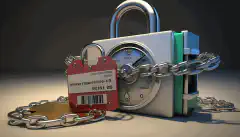Protect Your Credit Score: The Importance of Freezing Your Credit

Table of Contents
Protect Your Credit Score: Safeguarding Against Fraud and Identity Theft
Your credit score is a critical aspect of your financial wellbeing. It has a significant impact on your ability to secure loans, obtain credit cards from bank credit card issuers, and even rent a home. Given the crucial role that your credit score plays in your financial life, it’s vital to take steps to protect it from fraud and identity theft.
What is a Credit Freeze?
One of the most effective measures you can take to safeguard your credit score is to freeze your credit. A credit freeze restricts access to your credit reports from the major credit bureaus - Equifax, Experian, and TransUnion - making it difficult for anyone, whether a legitimate business or a fraudulent actor, to open new accounts in your name. By implementing a credit freeze, you limit access to your credit reports, ensuring that unauthorized individuals cannot misuse your information for credit fraud.
Please understand that Experian Consumer Services receives compensation from credit card issuers. However, it’s important to note that Experian’s involvement does not influence the information provided, and the opinions expressed are solely our own.
By taking these proactive steps to protect your credit score and limit access to your credit reports through the major credit bureaus, Equifax, Experian, and TransUnion, you can effectively mitigate the risks of fraud and identity theft, ensuring the security of your financial future.
How to Freeze Your Credit
To freeze your credit at the three major credit bureaus, follow these steps:
Equifax
- Online: You can freeze your credit online by visiting https://www.equifax.com/personal/credit-report-services/credit-freeze/
- By Phone: If you prefer to freeze your credit by phone, you can call Equifax at 800-685-1111.
- By Mail: You can also freeze your credit by mail by sending a request to Equifax Security Freeze, PO Box 105788, Atlanta, Georgia 30348-5788.
Experian
- Online: To freeze your credit online with Experian, visit https://www.experian.com/freeze/center.html .
- By Phone: If you prefer to freeze your credit by phone, you can call Experian at 888-397-3742.
- By Mail: To freeze your credit by mail, send a request to Experian Security Freeze, PO Box 9554, Allen, TX 75013.
TransUnion
- Online: You can freeze your credit online with TransUnion by visiting https://service.transunion.com/dss/orderStep1_form.page .
- By Phone: To freeze your credit by phone with TransUnion, call 888-909-8872.
- By Mail: To freeze your credit by mail with TransUnion, send a request to TransUnion LLC, PO Box 2000, Chester, PA 19016.
Additional Steps to Protect Your Credit
While freezing your credit at the three major bureaus is an important first step in protecting your credit score, it’s not the only step you should take. To achieve maximum protection from fraud and identity theft, it’s recommended that you also freeze your credit at additional, lesser-known bureaus. For a comprehensive list of these bureaus and instructions on how to freeze your credit with each, you can refer to the resources available at https://inteltechniques.com/freeze.html . By taking these extra steps, you can ensure that your credit score is protected from abuse and that you can maintain control over your financial future.
Other Ways to Protect Your Credit
In addition to freezing your credit, there are several other steps you can take to safeguard your credit score and prevent identity theft:
Monitor your credit report: Regularly review your credit report to identify any unauthorized activity or errors. You can obtain a free credit report from each of the three major credit bureaus once every 12 months. Visit www.annualcreditreport.com to request your reports.
Use strong passwords: Create strong and unique passwords for all your financial accounts. Avoid using the same password for multiple accounts. Consider using a password manager tool to generate and securely store your passwords.
Be cautious with personal information: Exercise caution when sharing personal information, both online and offline. Only provide sensitive details like your Social Security number or bank account information when necessary and to trusted entities.
Beware of phishing scams: Stay vigilant against phishing scams, which often involve unsolicited emails or phone calls attempting to extract personal information or trick you into clicking malicious links or downloading attachments. Be skeptical and verify the legitimacy of any requests before sharing information or taking action.
Protect your devices: Keep your devices, including computers and smartphones, updated with the latest security patches and antivirus software. Avoid using public Wi-Fi networks for sensitive transactions and refrain from entering personal information on unsecured websites.
Consider identity theft protection: Explore the option of identity theft protection services offered by reputable companies. These services can help monitor your credit and provide alerts in case of suspicious activity. Evaluate the benefits and costs associated with such services to determine if they are suitable for your needs.
By implementing these measures, you can significantly reduce the risk of credit fraud and identity theft. Being proactive and staying informed about potential threats is essential in safeguarding your personal information and maintaining a healthy credit profile.
Conclusion
Protecting your credit score is crucial for maintaining a healthy financial future. Freezing your credit at the major credit bureaus, such as Equifax, Experian, and TransUnion, is a powerful step in preventing fraud and identity theft. By restricting access to your credit report, freezing your credit makes it difficult for unauthorized individuals to open new accounts in your name.
However, freezing your credit at the major bureaus is just the beginning. To ensure maximum protection, it’s recommended to freeze your credit at additional, lesser-known bureaus. Resources like inteltechniques.com provide comprehensive lists and instructions for freezing your credit with these bureaus.
In addition to freezing your credit, there are other important steps you can take to safeguard your credit score. Regularly monitoring your credit report, using strong and unique passwords, being cautious with personal information, staying vigilant against phishing scams, protecting your devices, and considering identity theft protection services all contribute to a robust defense against credit fraud and identity theft.
By implementing these measures, you can reduce the risk of unauthorized activity, maintain control over your financial future, and protect your credit score from abuse.
References
- Equifax. Credit Freeze
- Experian. Credit Freeze
- TransUnion. Credit Freeze
- Annual Credit Report. Request Your Credit Reports
- Intel Techniques - Freeze - A comprehensive resource for freezing your credit with additional bureaus and detailed instructions.






